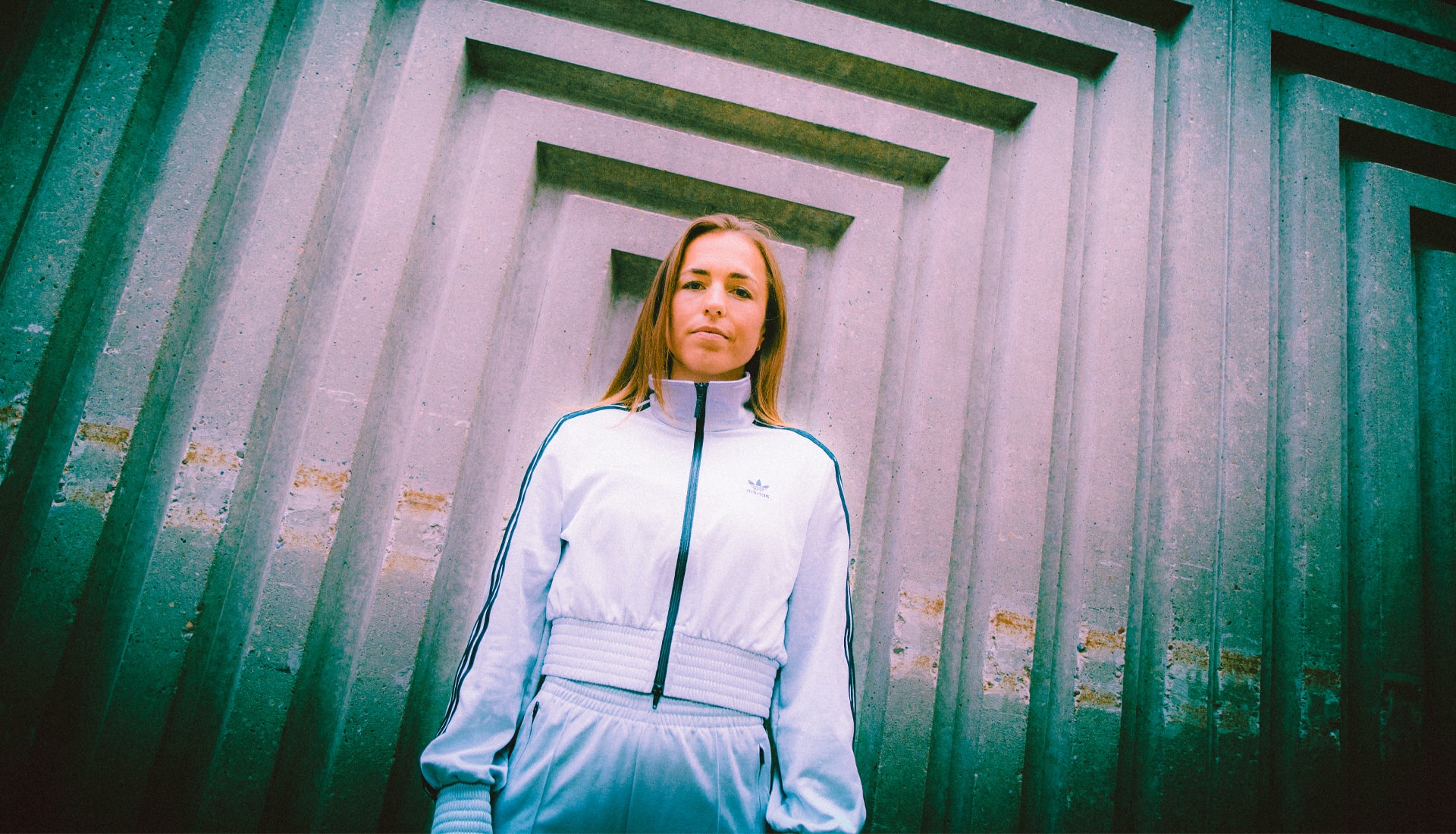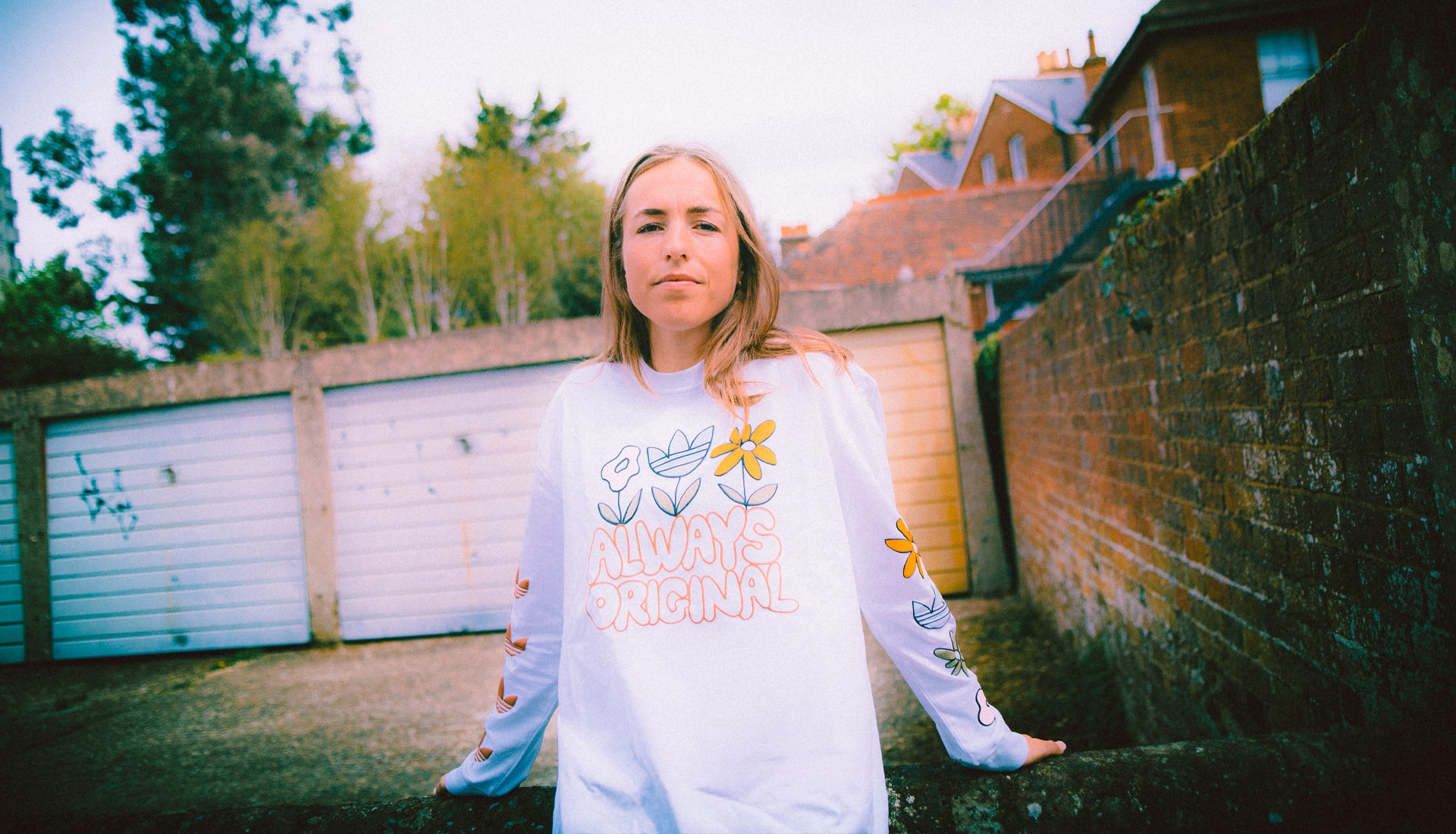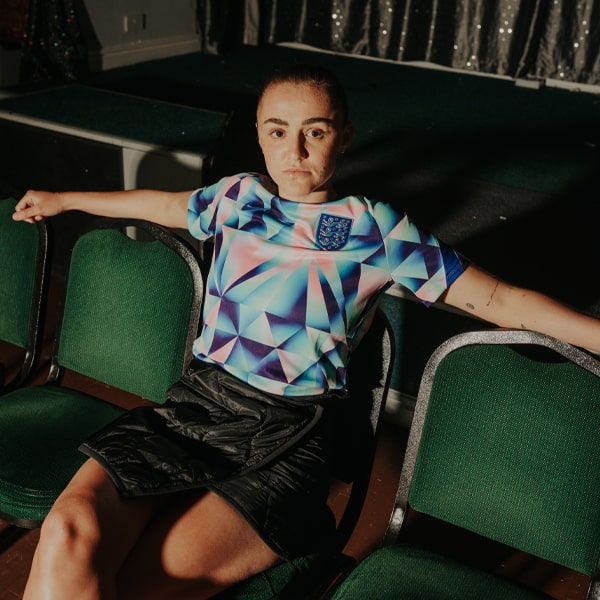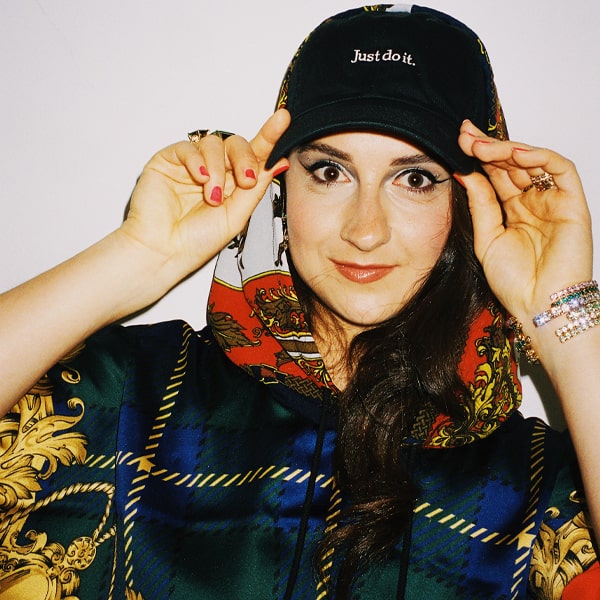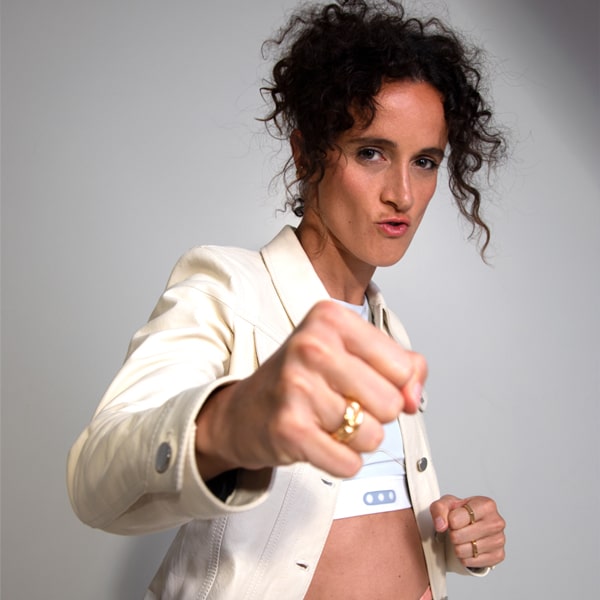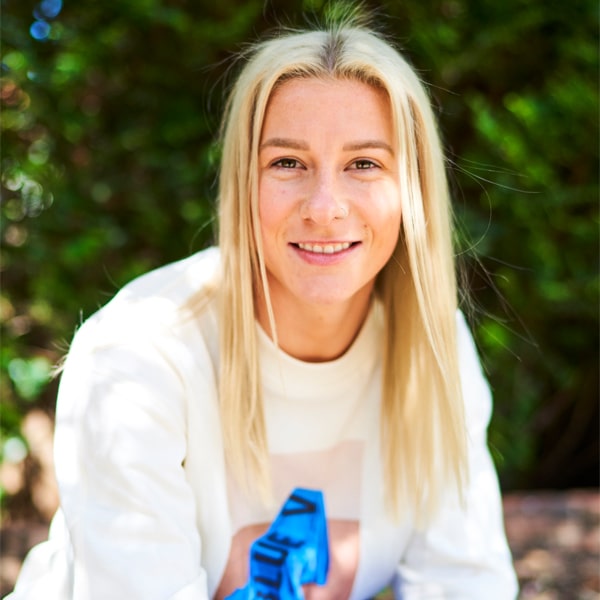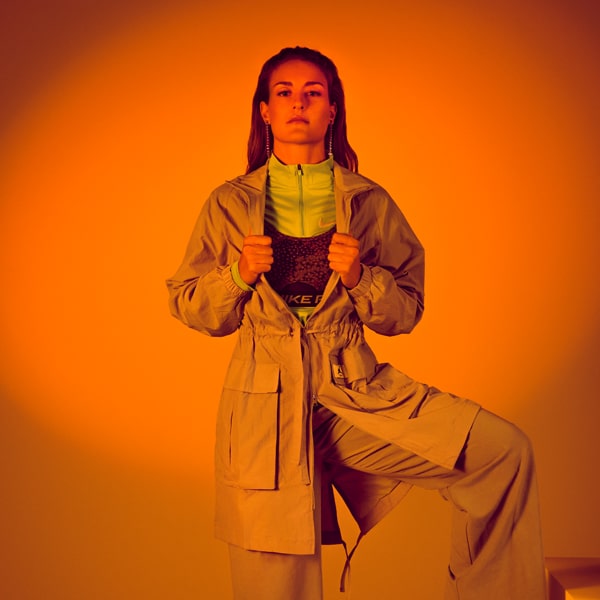With 100 international caps for Switzerland now under her belt, Lia Walti is player with bags of experience to draw upon – something that will continue to serve her well throughout the Euros. A great addition to any squad, and one we’re happy to have line up in SoccerBible Volumes: ‘All Power’.
Safe to say that when Jonas Eidevall came in at the helm of Arsenal Women in 2021, Lia Wälti took a little bit of time to adjust, taking on a new role in midfield. However, as the season progressed the Swiss international was able to show just how important she is and why she’s one of the most important players for the north London side. It’s a level of determined resilience that has served her well throughout her career, emerging, as she did, in a country that is maybe not as far along in terms of development when it comes to the women’s game. And it’s a quality that will serve her well when she faces up to life after football.
While her thoughts do stray in that direction from time to time, right now she’s fully focused on an international tournament that could potentially be a catalyst for how her nation views the women’s game – no pressure then. But pressure is part and parcel of what Wälti does, so much so that it’s just the latest challenge in what has already been a rewarding career. Elevating the women’s game in Switzerland through a tournament win though, a la the Dutch side of 2017? Well, that would just be the cherry on the cake.
What have you made of life in London, what were your expectations versus the reality?
Well, expectations… I come from a little village in Switzerland so I knew it was going to be a completely different life to where I come from. It’s a big, big city, with a lot of diversity. A lot to do, a lot to see, a lot of people, maybe a lot of noise and I feel like now where I live here in St Albans, I feel it’s a bit more like home so it’s really calm, but when I go into London it’s fun. There’s so much to see and so much to do. I’ve seen a lot so far – I need some time to see some more!
Do you feel like in this chapter in your life you’ve grown quite a lot mentally? Has it taught you things about yourself?
I think going abroad generally helps you, because you have to build your own life in a new environment with new people. You need to be really open to that environment. I think I’ve grown a lot. I learnt early in my teenage time to be alone, what it means to build new relationships and I think that helped me a lot and London, or England especially, with such a different culture, has been so good for me. People here are very kind.
We saw your neighbour when you let us in to your house, a cute elderly man with a big smile. It’s very humbling to see people like that…
Absolutely, my neighbour is a perfect example. He’s became almost our grandfather here and it’s just so nice to see him. Everyday we have some chats and we get to know each other in such easy ways and that’s nice. I think no matter where someone comes from people always welcome you, it’s really nice.
What about growing up and how football came into your life, can you set the scene for us?
I started playing football quite early, just in school and with friends in the playground and I’ve always enjoyed it. Sports in general – I wouldn’t say it was only football. My dad was a football coach in the town where we lived and I went to training with him and from there I fell in love with it. At that time we didn’t have the greatest opportunities for girls yet. It was a case of you could play football as a girl but there weren’t teams in your age where you could join. So for me it was clear I had to play, or for my parents, clear I had to play with boys because the girls teams simply didn’t exist.
So my football education was formed playing with the boys. I stayed with them until I was 17. Things have changed a bit, now the opportunities are better. I don’t look at it as a bad thing though. I think it was quite good for me to play with the boys for such a long time. I wouldn’t change a second of it, I had a great time and I felt ready by 17 to go into women’s football.
Can you feel that there’s so much more conversation about women’s football now and so many more eyes on what you do?
I feel like when I had my first international game, when I was 17, I’m pretty sure there was about 200 people at the game and it was on a shitty pitch, shitty stadium, somewhere in Switzerland where no one would even come, and now we’re playing in the best stadium possible and you can watch our games on TV, you can see newspapers and magazine that are not only about men’s football but also it’s about women and I think it’s growing so fast. It’s great to be part of it, but it’s also a huge, huge difference to what it was 10 years ago.
What’s the transition of that growth been like for you? Did it feel like one extreme to the other?
It didn’t really go from zero to 100 – it was a process over the years, so each year we got a little bit more of something but we’ve always had to fight for the smallest things at certain times where now we get them almost as normal. One of the best examples; how long did we have male kits? Male sizes, and before every game we were frustrated because we only got extra large or whatever, and we looked like something shit and now we get treated in a far more professional way, in every single way. I appreciate the fact that I experienced both sides of it because it makes you thankful for where we’re at now and also appreciating the game more and the progress it’d made.
What have you made of the international experience versus the club experience?
It’s two completely different worlds for me as well. Playing for Switzerland is maybe a huge difference to maybe the English national team or the Dutch and I think in Switzerland we’re still quite far behind with women’s football. Maybe not so much with the national team, we’re reaching big tournaments which was a big, big step but we’re still constantly fighting for things to happen and sometimes it’s a bit draining because it’s very slow to push things forward.
Switzerland is maybe not comparable to England as a country though so it’s relative. England is the football country itself and in Switzerland, we’ve got so many different sports as well – the focus is not only on football. Even male football is not as popular so it’s even harder to fight for change. At club level I think I experienced the complete opposite; I’m playing for Arsenal in one of the best leagues in the world and the game is growing so fast, the club is investing a lot in the women’s teams and you can just feel that you’re appreciated. You get a chance to play the big stadiums, big crowds, you play with the best players around you… it’s just on a different level and I’m really glad that I can experience that.
Was that kind of daunting at all when you think of coming over here and playing with the very best, or did you always know your level?
I wouldn’t say I always knew, it all came step by step, so I went from Switzerland to Germany and I waited for the moment to be ready for the next step. I came to Arsenal at a point where they wanted to go back to where they were, at the top of the game. We had a really successful first year. I’ve grown into this position and I feel like I’ve become an important teammate. Being here has made me stronger because I get to train every day with such incredible people. When you have to defend against Viv Miedema or Kim Little every day I think that can benefit you and I think that’s great.
Being involved in title races and success, how much have you loved the ride?
Yeah football is love/hate because of the turbulence. I think looking back now it’s been my fourth season and we’ve so far only won one trophy. We were always so close to winning more but in the end it was just always not enough and that can also be really hard. You can feel the pressure a lot and when we have a really talented team, we know we can win things. There were always little details which didn’t 100 percent quite fit yet and I think that’s the process we’re in now, we need that little extra bit to get the trophies back to Arsenal and I think this season we already started to take that step forward. I think we had a great season and I really hope we can get that trophy next year.
You have a fresh mindset all round. How would you describe yourself, your outlook on life in general, perhaps beyond football?
I would say football was always really important to me but I always knew there was a life afterwards so I always wanted to prepare myself for that. I am not happy when I’m just playing football, so I always need a kind of distraction or something to help my brain switch off from playing for a bit. It’s important to think about other things. I would say I’m more of a calm person, love my family friends, love spending a lot of time with them, I love to help and support them where I can. I think I’m quite open minded. I like to try new things but I also like to plan my life a little bit; I want to know where I go in the future and that’s why I’m preparing myself with my uni degrees and that is important, especially in woman’s football. We’re not earning as much money that we can just retire after football.
Thinking about the summer… a good tournament for Switzerland can show the powers that be the potential of the game once more. Do you feel that way?
Yeah I think so, I think the Dutch national team is the perfect example. I think they started, or they were a bit similar to us maybe before the tournament a few years back when they then won the Euros. From that point everything changed. Of course success would be the easiest way to change but we also have to be realistic. For us, we want to be the best possible team we can and approach the Euros in the best possible way. Hopefully we can be that underdog – we can be there without any pressure and surprise people. If we want to bring woman’s football a step forward in Switzerland we need to go to the big tournaments. We should be successful at these tournaments because that makes people watch us. That will inspire the next generation and I’d like to do that.
What about the actual experience of going away with the national team, is it a good atmosphere? Is it a bit of a party in the best possible way?
I think we’ve got a really good team spirit as our group has been together for quite a long time now, and it’s always fun. I can tell you the first days there’s always a lot of talking, you know, we’re all girls, we have to tell each other everything, so it’s fun. I wouldn’t say it’s a party place, I wouldn’t describe it like that but we always bring boardgames or card games, we all sit together each evening and have fun in that kind of way. It’s a very positive place to be.
You said about planning for the future… what are the things that you’d love to achieve both on and off the pitch more than anything?
I think in that sense I’m not really looking forward too far. Maybe more like a year ahead, so first of all I want to stay injury free for the rest of my career or as good as possible at least. I’ve had a few hard injuries in my life so I want to keep myself fit for my last years of my career and continue to play at the highest level as long as possible. I’m very conscious abut the need to take good care of my body. That’s a priority.
Then I’d like to win a few trophies with Arsenal and hopefully extend my contract with Arsenal. And as for my future, I just think I want to find something which excites me as much as playing football. I think that’s the biggest challenge in life in general; we all dream about finding a job afterwards which makes us happy and I think that’s not even that easy because we were living in such a different world. In this football bubble you can’t experience that many other different things because our schedules are very busy. So I think that is my main goal, to kind of build my second career after football with something I really love. Being honest, that also scares me a bit because I’m not exactly sure yet what it’s going to be! I’ve got different ideas and different things I like, different passions but I’m not 100 percent sure. I just hope when I look forward in five years that I’ll be in a place where I can be happy.
What are those core passions that you’d like to combine? Even if that job doesn’t necessarily exist, what are the things that you’d like to cross with one another to make that sort of perfect world after?
I always love working with kids, so if we think simple, if we combine that with football or something like that would make me happy. I am a very social person. Whether it’s kids or if it’s older people or if it’s disabled people, I would like to help and work with them. On the other hand, the business of sports is very appealing. I would love to stay within sport. That is a real passion. I’ve learned a lot about the business of the game over my career. So they’re two very different worlds but maybe I can at one point combine them in a way.
Have you experienced and seen first-hand the kind of positive effect that you, as someone with profile, can have on kids?
I did experience that and I always do with younger kids when we do some training with them. I think that’s the most exciting with kids, they learn so quickly and they’re inspired so quickly, so you can actually help them by educating and putting them on the right path. To have a big influence on them is a real privilege.
Pick up SoccerBible Volumes: 'All Power' edition exclusively online at prodirectsoccer.com
